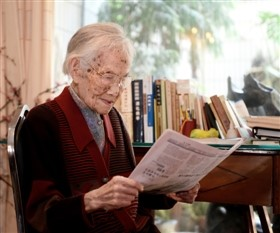A few days ago, a doctor from Fujian Flower Lane Church sent me a nine-minute long feature film with the theme “Chronicle of the People“. Produced by Fujian SSTV, the film, named The Power of Mercy, depicts the legendary life of the centenarian Xiao Renci.
With time limitation, however, there are still some aspects of the story that remain undisclosed.
In 1842, the First Opium War ended. After signing the Treaty of Tientsin in 1858, the Qing government was forced to open trading ports such as Fuzhou and Xiamen, and thus foreign religious groups had their warrant to enter the country. After that, the London Missionary Society expanded their bases in places like Huian. In early 20th Century, more than twenty Christian churches had been established in Huian County.
On 26th Aug., 1917, Xiao Renci (originally Xiao Xiuyin) was born in a Christian family in Huian County, Fujian Province. Her father, Xiao Tengfang, after graduating from Fuzhou Yinghua Academy (commonly known as “Yinghua Zhai”) founded by American Churches of Christ in late Qing Dynasty, once preached in Houcuo and Qianting Churches in Batou Township, Huian County. He was ordained as a pastor and later became a senior member in Huian parish of southern Fujian.
Xiao Tengfang intentionally oriented his children towards the medical field, which had influenced Xiao Renci since her childhood. In 1936, she entered the School of Advanced Nurse Midwifery affiliated to the private St. Luke’s Hospital (established by the Church of England in 1912) in Putian County, Fujian, and graduated after three years. This experience had laid the foundation for Xiao’s life-long medical career.
After her graduation, Xiao became a midwife in Huishi Hospital – the first western medical hospital of Quanzhou founded by the English Presbyterian Mission and the predecessor of the Second Affiliated Hospital of Fujian Medical University. To demonstrate her aspiration, Xiao changed her given name from Xiuying to Renci that means “mercy” in Chinese, and it became her valuable morality for a lifetime. During the decade of working in the hospital, Xiao was an outstanding midwife. At this time, she met Lin Junde who was an intern doctor and also a Christian. Lin was once an apprentice in Zhangpu Yuanliang Hospital (founded by the English Presbyterian Mission in 1889) in southern Fujian, and entered the doctors’ class of Huishi Hospital in 1930, graduated with excellent grades after five years and became a doctor of the hospital. On 25th Jan., 1945, Xiao Renci and Lin Junde got married.
After China’s liberation in 1950, the couple quit their jobs in the hospital and opened a clinic in Shishi County. Several years later, the clinic was merged with two other private clinics to become the Shishi United Hospital, and then turned into the Shishi Hospital (former Shishi General Hospital). The couple then became two of the founders of the hospital. Xiao was one of China’s first midwives. She dedicated her profession to the promotion and application of modern midwifery, and spared no effort in the popularization of training local doctors and midwives. Thus, she was hailed as the “Guanyin of Fertility”, for saving many a woman suffering from dystocia.
After retiring at the age of 55, Xi Renci was rehired by the Shishi Hospital till her 70s. Even at this time, flocks of patients still rush to see her. Despite being saddled with loads of work, she persisted in regularly going to Shishi Church and asked her children to send her donations for the church. She piously remembered the following: “and do not forget to do good and to share with others, for with such sacrifices God is pleased” (Hebrews 13:16).
Xiao constantly said that every Christian should appreciate life and help those who are often in need. In 2007, when she embraced her 100th birthday, she donated one million yuan to Christian churches and congregations instead of using it to hold a grand birthday celebration. She also donated half-a-million yuan to the elderly care center in Qinshan Township, Jiuzhen Town, Zhangpu County in southern Fujian, where her husband once worked. She hopes that such gestures will bear fruits of glory for God and also encourage more people to do good deeds.
Lin Muli




Thank you – this is inspiring.